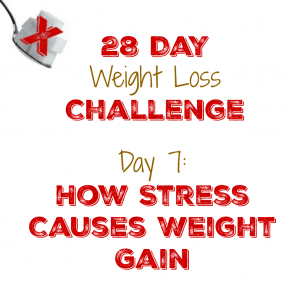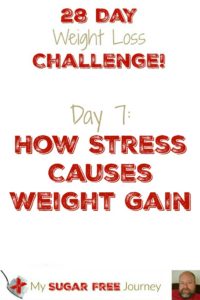Over the course of our 28 Day Weight Loss Challenge our Daily Recap videos will be where I post the notes I have written for the talks I do in the FaceBook Group each night. Hopefully this will make what we are talking about easier to follow for everyone that wants to join us in the challenge. You can see each of the 28 Day Challenge recap posts here. Please subscribe to the YouTube channel to never miss an video.
Stress also has an effect on weight gain. Science tells us that if you put animals or people in stressful circumstances, they will often eat even if they aren’t hungry. Have you ever had a stressful day and just wanted to unwind with a pint of Haagen Dazs? Why is that?
Right on top of your kidneys sits you adrenal glands. The job of your adrenal glands is to secrete the hormone Cortisol. Cortisol is your body’s response to stress. It is cortisol that keeps you from going into shock when you dehydrate, keeps you awake when you are fatigued but in a stressful situation, and reduces inflammation. Cortisol is supposed to spike when you are in a dangerous situation like being chased by a bear or getting cut off in traffic, and then slowly subside.
But what if you are always under stress? If you are one of the countless Americans that live paycheck to paycheck and aren’t confident where your next meal is coming from then those adrenal glands are constantly pumping out cortisol. Cortisol increases blood pressure, increases blood glucose levels and increases heart rate. Cortisol also increases the desire for “comfort food” and packs on fat around your midsection.
We know that it is the poorest sections of people in America that have the most stress and suffer most from cortisol overload. Risk factors for this cortisol problem is being poor, being female, being a minority, and having very little confidence or authority. Children have these stressors as well and if your body conditions you to seek comfort in sugary foods when you are young, that’s a hard habit to break as you get older.
Cortisol not only triggers craving for comfort foods, but it seems to trigger those cravings primarily at night. This is why you need that late night dessert or snack before going to bed. And these so called “stress eaters” exhibit increases in insulin, weight and cortisol at night.
Stress also decreases your sleep time and BMI increases among people who get less sleep. Sleep deprivation increases cortisol and leptin which mimics starvation and hunger. It also activates the hormone ghrelin which makes you desire food. A high BMI is a strong predictor of sleep deprivation due to sleep apnea. Both my wife and I used to be horrible snorers until we lost about 100 lbs each, now we don’t snore at all.
So insulin and cortisol work together to drive weight gain. Insulin essentially tells your body to store fat and cortisol tells your body where to put it. They do different things but work together to make you fatter.
So these three things, hunger, reward and stress, conspire together to drive high levels of insulin and weight gain. The high levels of insulin suppress leptin so you always feel hungry and don’t want to move or expend energy. It also makes you crave high-fat and high sugar foods as a reward. Stress releases cortisol which promotes excessive food intake. Taken together, it’s a hormonal trap that is difficult to get out of.
All notes taken from information found in Fat Chance by Dr Lustig, Good Calories, Bad Calories by Gary Taubes, The Angriest Trainer Podcast and Jimmy Moore’s Podcasts.



Wow, this is in every recsept what I needed to know.